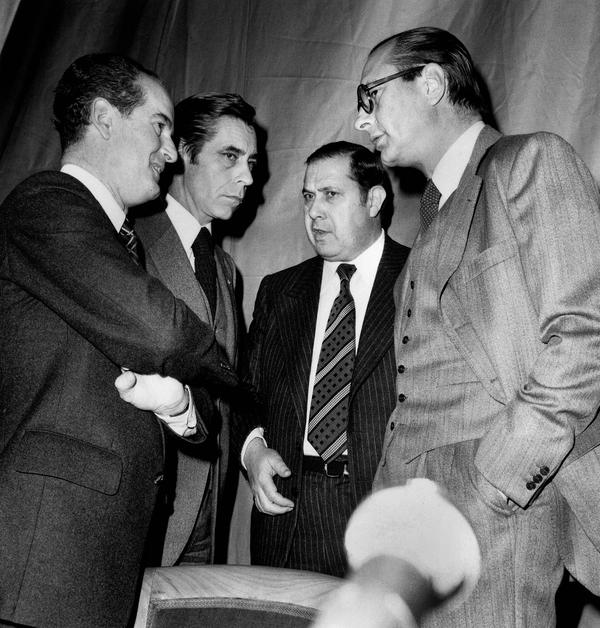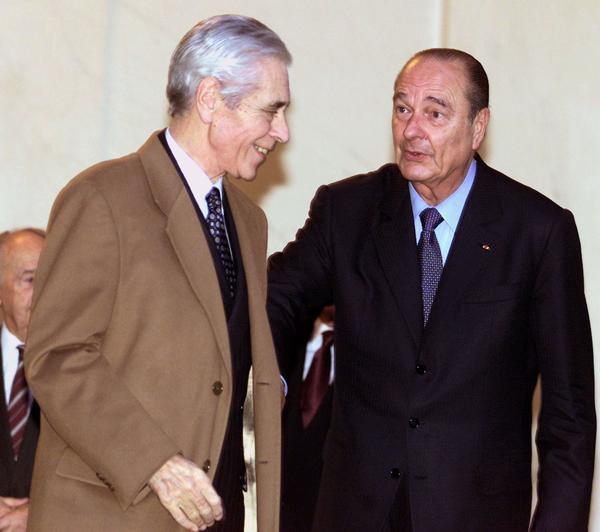One who was president of the Constitutional Council, minister of Charles de Gaulle and senator and mayor of Perigueux died last night in Paris at the age of 93.
the course of Yves Guéna was initially that of loyalty. Fidelity to one man, General de Gaulle, he was one of the first to join in June 1940. fidelity to the principles embodied in this man’s eyes. Loyalty to his memory as he was, the evening of his life, President Charles de Gaulle Institute while presiding over the Constitutional Council, an essential part of the Constitution established by the founder of the Fifth Republic.
Born in Brest July 6, 1922, the young Breton has not yet eighteen when he embarks on 19 June 1940, on a tugboat of the navy because, he explained “a general had just launched the London radio call to continue the fight.” And this is the day of his 18th birthday he meets for the first time this general called make history. After rubbed repeatedly, he will see the last almost thirty years later, April 23, 1969, after the Council of Ministers before its four-day final withdrawal from political life.

Claude Labbé Yves Guéna, Charles Pasqua, and Jacques Chirac during a consultation at the central committee of the RPR intercontinental hotel in Paris January 31, 1977 Photo credit:. Rue des Archives / Credit © Rue des Archives / AGIP
Committed to the Free French Forces Yves Guéna fights in Africa, France and finally Germany in the tanks of the French 1st division free and the 2nd armored division of General Leclerc. Wounded several times, he ended the war with the Legion of Honour, War Cross and the Medal of the Resistance. And married on 23 July 1945, with Oriane of Bourdonnaye, after a Périgord family, whom he had seven children. Coincidentally, the mother of one will become in 1956 the second wife of Pr. Robert Debre, father of Michel Debré who play a big role in the career of Yves Guéna.
Celui- one at its demobilization, appeared in support of the new national School of administration, created specifically by Michel Debré under the leadership of General de Gaulle. The first promotion is called “Fighting France”. Yves Guéna Staff fate of the administrative section in 1947. Disregarding the “big body”, he chose civilian control in Morocco. There remains then ten years, Morocco acceded to independence, joined the State Council in 1957 as master of requests.
General de Gaulle having returned in 1958 to head the government, Michel Debré appointed Minister of Justice, made by Yves Guéna his chief of staff, and retains as deputy director when it becomes his first round minister after the election of General to the Presidency of the Republic. Place Vendome, he participated in the drafting of the new Constitution. At the Hotel Matignon, it specifically follows the Community of military affairs who has the ambition to gather – with the notable exception of Guinea – the former French possessions in Africa. He established, in this respect, relations with Félix Houphouët-Boigny, which earned him to become high commissioner and ambassador in Ivory Coast. He stayed from July 1959 to 1962.
Gaullist left
That year, he chose to make his entry into politics. Defining itself as Gaullist left, he ran for election in Dordogne under the label of the Democratic Union of Workers (UDT) which he is a founder. He was elected and will be constantly re-elected until 1981, when the “pink wave” will force him to yield to Socialist Roland Dumas a seat however it will recover from 1986 to 1988. Incidentally, he joined the General Council ( 1970) takes the town of Périgueux (1971), sits on the Regional Council of Aquitaine.
in 1967, however, we will see little in the Palais Bourbon. In April, Georges Pompidou, Prime Minister, appointed him Minister of PTT, then the information at a crucial period (May 31 to July 10, 1968). Maurice Couve de Murville, installed at Matignon in turn makes him the PTT portfolio. From this period dates the transfer in Périgueux of printing stamps – great favor against Perigord voters – but failed, thanks to the efforts of Yves Guéna, project finance minister, Valery Giscard d . ‘Estaing, to create a national telephone company, project behind which reveals a willingness to privatize

Yves Guéna with Charles Pasqua in 1977 Copyright: Rue des Archives / © Rue des Archives / AGIP
case Relationship effect? While Yves Guéna has not recovered in 1969 its portfolio in the government of Jacques Chaban-Delmas, his deputy in the Dordogne, Claude Guichard, member of the Independent Republicans (the Party of Giscard), refuses to resign for it to regain his seat. Yves Guéna reinstates the State Council. Pierre Messmer, Premier Georges Pompidou became president of the Republic, comes out to confide in April 1973 the Ministry of Transport and in March 1974 the Department of Industry, Trade and Handicrafts.
Pompidou dies. In the presidential election following Yves Guéna supports the first round the candidacy of Jacques Chaban-Delmas, but the second round, rallied by reason than Valéry Giscard d’Estaing, that though he does not like. So is it in line with Jacques Chirac, who became the prime minister of the new president, will also soon conquer, hussar, the General Secretariat of the Gaullist movement, the UDR (Union of Democrats for the Republic). And Chirac, anxious to curry favor with the “barons” of the movement, for the most reluctant for it, going to Yves Guéna, impeccable Gaullist deputy to the General Secretariat and the General Delegate to school. As the member for Périgueux (he was reelected in 1973 and 1974 in a by-election) published in 1975 a book of doctrine, Heads , in which we find the old labor-capital association project dear to General de Gaulle.
in April 1976, the following general secretary of the UDR. The following December, however, Jacques Chirac, a few months after leaving noisily Hotel Matignon, transforms the Gaullist movement Rally for the Republic (RPR) and, in turn, directly over the reins. Yves Guéna – who refused, after the resignation of Jacques Chirac, a ministerial post in the new government formed by Raymond Barre – became soon the political delegate and in 1978, the political adviser and the General Treasurer
.
“Gang of Four”
It was then that constitutes, in the words of the old adventurer Gaullist Alexandre Sanguinetti, the “Gang of Four”, bringing together two former advisers of Georges Pompidou, Pierre July and Marie-France Garaud and Charles Pasqua and Yves Guéna itself. This “band” is accused by the caciques RPR want to divert the movement to its advantage and to circumvent Jacques Chirac, whom she would have inspired in particular the controversial “Call of Cochin” against the head of state and the ” foreign party. “
5 March 1979 anyway, this bodyguard ceases to exist. Indeed, Yves Guéna ad to Jacques Chirac that he abandons the direction of RPR and his position as political counselor: “Not having the means to exercise my functions, I give up.” “My decision is irrevocable,” he urged the mayor of Paris who begs him to stay. Illustration of this distancing: in 1981, even as Jacques Chirac’s candidate for the presidency of the Republic, Yves Guéna supports Michel Debre, who also, is running for the highest office

Yves Guéna, then president of the Constitutional Council, with Jacques Chirac in 2001 Copyright: Georges Gobet / AFP
For the Gaullists, this year 1981 is a bad year since, in the wake of the election of François Mitterrand as President of the Republic, the Socialists and the Communists obtain an absolute majority in the Palais Bourbon. Yves Guéna lost his seat in the Dordogne in favor of Roland Dumas. However, it does not give up. He founded the Pericles circle that proposes to prepare the “post-Mitterrand” and publish this in mind, a book, The first hundred days (what the right will do when she returns to power ). In 1982, he published his memoirs under the title The certainties of time , 1940-1969 (Flammarion). In 1986 he found his seat. Then, in 1989, emigrated to the Senate, where he became one of the vice presidents.
In January 1997, the centrist René Monory, President of the Upper House, chose this Gaullist intransigent to go sit on constitutional Council, replacing Etienne Dailly who has just died and he must complete a nine-year term began in February 1995. of course, Yves Guéna must renounce any other mandate, starting with the mayor of Perigueux (it was anyway announced in 1996 its intention not to run again in 2001). Chance of life: the Constitutional Council is now chaired by Roland Dumas, old friend of François Mitterrand who made him this gift before leaving the Elysee. Now, caught by the Elf scandal, Roland Dumas to the Council must leave in March 1999 and resigned a year later to the institution of the Royal Palace. And that’s his old political opponent, Yves Guéna, which is chosen from his peers to succeed him in the presidency. Sic transit …
In 2004, he leaves the presidency of the Constitutional Council, which replaces another Gaullist Pierre Mazeaud.
curious and eclectic spirit, Yves Guéna had taken the time to publish, in addition to his political writings, several books including one devoted to Catiline, in his eyes too battered by history, and the other the general financial Louis that was the Baron. He even took the time to compose a play, Phaedra 2000. This free man did not hate provocation. He wrote regularly in the columns of L Humanity and maintained relations with the Communists forged in the Resistance.
No comments:
Post a Comment